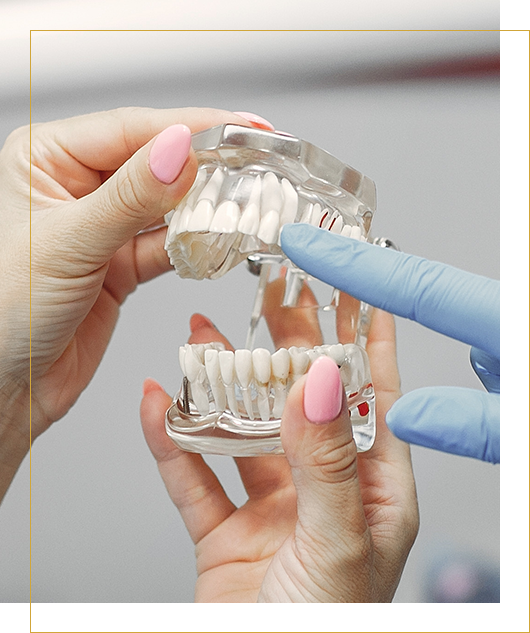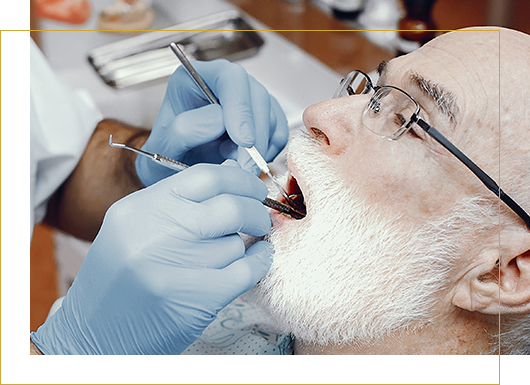Full-arch Implants in Mundaring
Have you ever wanted your smile to look perfect in every way? If so, then Mundaring Dental & Implant Centre’s full-arch dental implant treatment may be exactly what you’re looking for to get a beautiful set of teeth.


Discover Your New Smile with Our Full-Arch Implants
At Mundaring Dental & Implant Centre, we offer full-arch implants as a permanent replacement for missing teeth. This type of implant uses a series of 4-6 dental implants to restore an entire arch of missing teeth. Our full-arch implants are designed to give you a natural-looking smile that lasts. Using high-quality materials, our implant technology gives patients results that exceed expectations. To learn more about how we can help you, call us today at 08 6495 2000.
Reasons Why You Would Need Full-Arch Implants
You deserve to have the best smile possible, and our qualified team is here for you. We offer full-arch dental implants so that your teeth will be beautifully restored. Give us a call today so we can schedule an appointment right away.

Missing several teeth: No matter what kind of tooth you have, missing multiple teeth will necessitate a full-arch replacement. It’s an option that provides long-term benefits without the need for special maintenance or discomfort in exchange for dependable outcomes that will endure throughout your lifetime.
The inconvenience of the denture’s thickness: Dentures can effectively replace missing teeth, but some people say they have a strange sensation when they put them in. With full-arch implants at Mundaring Dental & Implant Centre, you will enjoy your favorite foods and regain natural sensations.
Extrusion or movement of opposing or adjacent teeth: When teeth fall out, neighbouring ones may start to move towards the space left vacant. If you are looking for ways to handle the problem without compromising aesthetics or function, then visit us at Mundaring Dental & Implant Centre, where we provide full-arch implants that blend perfectly into your mouth.

Why choose
Mundaring dental
& implant centre

Convenient Quality Dental Care
With over 50 years of combined experience, our team of professionals continues to provide high-quality dental services, from general dentistry and dental implant services to restorative and cosmetic dentistry.

A Compassionate Team Utilizing Modern Technology:
Mundaring Dental & Implant Centre offers the latest dental implant technology and techniques to provide you with the best possible results. Our state-of-the-art equipment makes your dental implant experience as easy and stress-free as possible.

Easily Accessible
Mundaring Dental & Implant Centre is proud to offer flexible payment plan options to make sure that everyone receives the dental care they need.

Same-day Dentistry and Fast Turn Around Time
Mundaring Dental & Implant Centre offers same-day service for various dental treatments, including dental crowns. You can get high-quality dental care and more natural-looking crowns in just one visit!
FAQs
Implants are not suitable for all individuals, so please consult our dentist to take a comprehensive evaluation. Here are a few factors that will determine whether you can undergo implant dental surgery:
- Individuals who have missing teeth in their lower or upper arch, or both.
- Full-arch dental implants are an option for individuals who are unable to wear traditional dentures.
- A person who does not take certain prescriptions.
- The gum tissue around your teeth is healthy, and you have sufficient bone density. A dental professional may recommend a bone graft if your bones are weak.
- Do not suffer from any medical conditions that hinder the recovery period or implant procedure.
We’ll ensure you know exactly what’s happening during the full-arch implant procedure. This treatment can sometimes be completed in one session, depending on the individual.
There are typically five steps in full-arch implant dental treatment, which may be performed over a few visits:
Sedation:
You will be given a local anesthetic to ensure that you do not feel any pain during the invasive procedure. If you are uneasy about dental treatments and need assistance in staying calm, your dentist may offer you additional sedation treatment options.
Extraction of teeth:
Any remaining teeth must be extracted before implants can be placed. In cases where we need to remove a lot of teeth or if we detect signs of gum disease or infection, we may give you temporary provisional teeth and resume your implant treatment once your mouth is healed.
Placement of the implant:
If your mouth is healthy enough for implants, your dentist will prepare the implant sites to prevent infection. We will then carefully create an incision in your gums and attach the titanium implants to your jaw. In most cases, two implants are placed in the front of the mouth and two in the back, although additional implants may be needed depending on your jaw’s size and condition.
Dental bridge placement:
Following implant placement, we will clean and disinfect the affected areas and attach your dental bridge. Our dentists create replacement teeth that look as natural as possible and are securely attached with implants.
Recovery:
Afterwards, you can head to the recovery room to recover from the anesthetic, taking care not to strain yourself and following your dentist’s advice about pain management and food consumption.
Full-arch implant treatment involves the placement of four to six implants to replace a lost arch of teeth. Following the placement and healing of these implants, your dentist will design a pair of permanent or removable implant-supported dentures that clip into the implants.
These dentures will never shift or move compared to conventional dentures, and they feel and look perfectly like real teeth. Full-arch implants also help to protect and preserve your jawbone after tooth loss.
Full-arch dental implants can generally be performed at any time as long as you are in good health. Nonetheless, the length of time you have worn dentures will affect your bone structure, and you may require more oral surgery.
In the days following a tooth extraction, your body begins reabsorbing minerals in your jawbone to make the best use of your body’s resources. As a result, your jawbone gradually shrink. You will be unable to keep your dentures for the next ten to twenty years. This is known as “facial collapse.” Unfortunately, bone is required for a successful dental implant procedure. Your bone must fuse with the implants for them to remain stable in your jaw. Without bone regeneration, dental implants would not be durable.
Protect your investment and ensure your new smile lasts by following a few simple tips listed below:
Make sure you brush your teeth twice a day.
Just like real teeth, a full-arch implant is prone to plaque and tartar buildup, so make sure you brush twice a day. When brushing your dental implant bridge, be sure to use a soft-bristled toothbrush twice a day. In addition to protecting your gum tissue and dental implants from cavities, keeping your bridge in good condition is also important.
Use non-abrasive toothpaste.
It is essential to brush your teeth twice daily with toothpaste that is not abrasive. Consult your dentist for toothpaste that will be appropriate for implants.
Regular flossing is essential.
Remove food debris between your bridge of teeth and your gumline with a water flosser or dental floss. Plaque is prevented from hardening into tartar, and bacteria that may infect gums around dental implants are removed. Your oral hygiene routine may benefit from adding a rubber-tipped stimulator or sulcus brush.
Visit the dentist regularly.
By maintaining a regular dental schedule, you can ensure that your full-arch implants will last a long time. Get in touch with your dentist as soon as your gums become tender or swollen.
As with all surgical procedures, there are some risks associated with full-arch implants. Taking every precaution to minimize these risks is crucial to us. We will make sure you have all the information before you agree to the treatment so you can make an informed choice.
Here are some risks to consider:
- Infections surrounding the implants
- Implant failure
- Damage to the nerves and blood vessels
- Infection of the sinuses following placement of an implant in the upper jaw
Following the procedure, you might experience some discomfort. This, however, is typically manageable with over-the-counter pain relievers.
Take a look at some of the most common factors that can affect full-arch dental implant healing:
Food Consumption
The type of diet you follow after dental implant surgery also plays a critical role in implant success. After the surgery, you will be advised to follow a brief soft food diet. It is also an excellent idea to chew on the opposite side of your mouth from your implant if possible. Soft foods can help you avoid applying excessive force to your implants before they have had time to heal. Eating chewy, crunchy, or hard foods, on the other hand, can put excessive stress on a healing implant, causing it to slip out of place or rupture.
Smoking
The health consequences of smoking are both general and oral. In turn, your dental implants may also be affected by this. As a result, smoking affects the body’s healing process, making implants more susceptible to infection after surgery. In addition, it constricts your blood vessels, which can result in severe bleeding during and after surgery. Also, smoking can make it hard to put dental implants in, so many implant specialists want you to stop smoking before your procedure.
Bone volume
The density of your jawbone is another critical factor in determining the success of dental implants. The implant must osseointegrate with the jaw bone. A person’s jawbone gradually weakens after losing one or more teeth. This results in less bone mass in your jaw as you go without teeth. Even those with low bone density can receive dental implants, but they may need to undergo additional procedures such as bone grafting.
Having healthy gums
Dental implants are also affected by the health of your gum tissue, which is yet another reason why oral hygiene is vital. If you have gum disease, you may be at risk of developing an infection known as peri-implantitis, linked to implant failure. Therefore, dentists recommend treating gum disease before placing dental implants to ensure there is no infection.
Dental hygiene
Dental implants require good oral hygiene. Even though dental implants are artificial teeth, they are not completely free from care. They have the exact same oral hygiene needs as natural teeth. You should brush twice a day, floss once a day, and use mouthwash. By controlling plaque and bacteria in your mouth, you can prevent infections and increase the success rate of implant placement.
